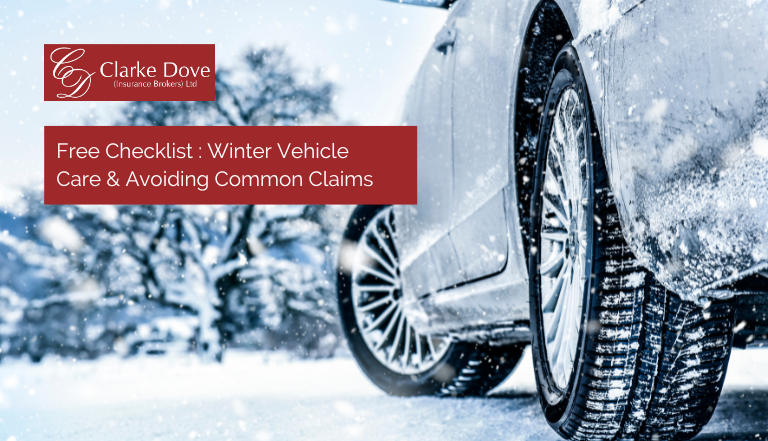Download our free Checklist.
Winter Driving
December 2024
Winter Vehicle Care: Avoiding Common Claims
Winter brings unique challenges for UK motorists. According to Covea Insurance, drivers are 33% more likely to make insurance claims during winter months. [1]Road safety champion and head of engineers at Covéa Insurance, Barry Street, comments:“A harsh winter will mean that roads are more treacherous than usual, which could lead to more incidents resulting in insurance claims. With longer periods of darkness, fog, rain, and even ice and snow, winter can be a demanding time to drive, so it’s important to spend a little time preparing.”Here's your comprehensive guide to keeping your vehicle safe and reliable during the cold season.
Essential Winter Vehicle Checks (Download your free copy here)
Tyres
• Consider winter tyres when temperatures drop below 7°C
• Check tyre pressure weekly – cold weather affects pressure
• Look for signs of wear or damage
Fluids
• Top up antifreeze – use the correct concentration
• Keep screen wash topped up with a winter-grade solution
• Check oil levels regularly
• Maintain brake fluid levels
Battery Care
• Batteries work harder in cold weather
• Get it tested before winter sets in
• Keep terminals clean and connections tight
• Consider a trickle charger for infrequently used vehicles
Winter Emergency Kit
Keep these essentials in your car:
• Ice scraper and de-icer
• Torch and spare batteries
• Blanket and warm clothes
• Jump leads
• First aid kit
• Shovel
• High-visibility jacket
• Snacks and water
Safe Winter Driving Tips - Adapting Your Driving for Winter Conditions
Winter driving requires a completely different approach to summer driving. One snowy morning, Sarah learned this lesson the hard way when she approached a junction at her usual speed and slid into the middle of the road. Thankfully, no one was hurt, but it taught her the importance of increasing stopping distances in winter. On icy roads, your car can take up to 10 times longer to stop than on dry roads [2]. If you usually leave 2 car lengths between you and the vehicle ahead at 30 mph, you should increase this to about 20 in icy conditions.
Maintaining Visibility in Challenging Conditions
We know that you could be running late for work and only have cleared a small "peephole" in your snow-covered windscreen. But don’t risk it! This could create a hazard for pedestrians and other road users if visibility is impaired.
The Highway Code is clear on this:
• you MUST be able to see, so clear all snow and ice from all your windows
• you MUST ensure that lights are clean and number plates are clearly visible and legible
• make sure the mirrors are clear and the windows are demisted thoroughly
• remove all snow that might fall off into the path of other road users
Smart Parking Strategies
One of our clients discovered the importance of smart winter parking when a snow-laden tree branch crashed onto his car during a storm. Whenever possible, use a garage – it protects your vehicle from the elements and makes your morning routine much easier. If you must park outside, choose spots away from trees during strong winds and consider investing in a good car cover. A practical tip learned by many experienced winter drivers is to point wipers away from the windscreen when parked overnight – this prevents them from freezing to the glass and potentially tearing when you try to use them.
Essential Winter Maintenance
Regular maintenance becomes even more critical during winter months. A neglected car battery might catch you out on a frosty morning. Winter puts additional strain on car batteries, so regular checks are essential. Keep washer fluid topped up – you'll use far more than in summer due to salt spray and slush.
Regular tyre inspections are crucial; proper tyre pressure and tread depth can mean the difference between staying on the road and sliding into a ditch. One mechanic recommends considering monthly mechanical checks as an insurance policy – a small investment of time that could prevent major problems when you're most vulnerable to them.
Remember: Prevention is better than recovery. A well-maintained vehicle is your best defence against winter driving hazards.
Sources: [1] Ageas Safe Driving Hub - https://www.ageas.co.uk/solved/road-safety-weather/
[2] The Highway Code - https://www.highwaycodeuk.co.uk/icy-and-snowy-weather.html

